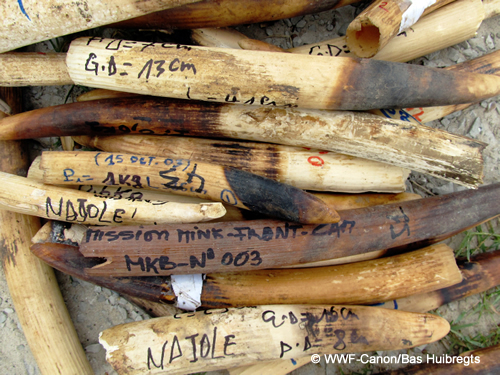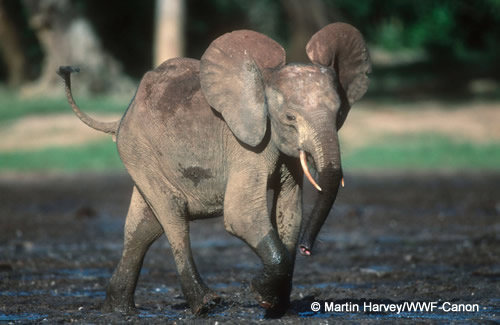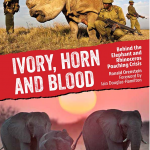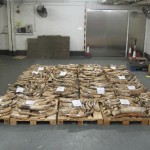
Gabon has demonstrated to the world it is committed to taking action against illegal wildlife trade by publicly burning 4,825 kg (10,637 lbs) of elephant ivory.
The contraband included 1,293 elephant tusks and 17,730 ivory trinkets — representing the deaths of more than 850 elephants.
President of Gabon, Ali Bongo, ignited the ivory pyre today in Cite de Democratie.
Gabon has a policy of zero tolerance for wildlife crime and we are putting in place the institutions and laws, to ensure this policy is enforced.
Gabon is one of the ten member states of COMIFAC, all of which recently approved an agreement to strengthen law enforcement efforts against wildlife trafficking which is plaguing the region.
According to Suparna Biswas, Country Director of WWF-Gabon, the ivory trade chain needs to be broken.
This time the decision has come from the top and should be an example to others. Many Central Africa ministries still proudly display pieces of worked ivory in their offices. Many government officials are implicated in illicit ivory trafficking. This must end.
Ivory stockpile audit
In order to ensure that all government-owned ivory was accounted for prior to the burning, WWF and TRAFFIC worked with Gabon to independently audit the stockpile.
Video from Gabon’s ivory audit:
Stefanie Conrad, WWF Central Africa Regional Programme Office Representative, said her organization supports Gabon’s decision.
WWF supports Gabon’s decision and sees the move as an indication of the country’s commitment to curbing elephant poaching and the illegal ivory trade. Ivory of illegal or unknown origin cannot be sold legally internationally for commercial purposes. Gabon has acted commendably in deciding to put such ivory beyond use.
Dr. Tom Milliken, TRAFFIC’s ivory and rhino horn trade expert, also applauded Gabon’s decision.
Gabon’s actions effectively keep the ivory out of the way of temptation.
It is estimated that tens of thousands of elephants are being killed every year on the African continent, with Central Africa being hit hardest.

China, Thailand fail to regulate ivory trade
Africa’s elephant slaughter is funded mainly by the Chinese market, where ivory is believed to be a symbol of success. Legal ivory trade is allowed in China, but efforts to regulate the trade have failed.
Dr Colman O’Criodain, WWF’s wildlife trade policy analyst, said there is a blatant disregard for ivory trade laws in China.
In the last two years we have seen open flouting of China’s internal ivory trade laws. Many visitors, including foreign government representatives attending CITES-related meetings in China, have reported seeing ivory openly on sale without the required certification cards that prove legality of origin.
O’Criodain also pointed to Thailand as another problem country that is unwilling to control the abuse of its ivory trade loopholes.
It is imperative that CITES member states take remedial actions to shut down unregulated or poorly regulated domestic ivory markets, especially the world’s largest markets in China and Thailand.
Last month, the connection between global insecurity and a surging ivory and rhino horn trade was examined at the U.S. Senate Committee on Foreign Relations Hearing. Tom Cardamone from Global Financial Integrity (GFI) testified that wildlife trafficking funds global terrorism and armed insurgent groups.
Photos © WWF according to WWF media guidelines. Photos may not be downloaded from this site.




